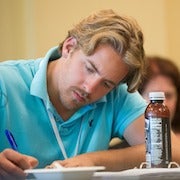
Aaron Orlowski left Metcalf Institute’s 2014 Annual Science Immersion Workshop for Journalists with a brand new perspective on how researchers approach their work.
“I was the only person in our newsroom who had the experience of talking to scientists about what they mean when they talk about [scientific] uncertainty,” said Orlowski, a former environment and health reporter for the Orange County Register in California. “I could more effectively push back [with editors] and say we really need to keep this nuanced statement because otherwise it’s just not accurate.”
Orlowski’s desire to become an environment reporter grew out of his appreciation for the outdoors and “wild places” as a teenager backpacking in Colorado and the American West – experiences that had a profound impact on his career choice. “I think a lot of journalists would like to give a voice to the voiceless,” explained Orlowski. “For me, that voiceless group is nature.”
After graduating with a BA in writing, literature, and publishing from Emerson College, he worked as a general assignment reporter for the Tioga Tribune in North Dakota and the Rapid City Journal in South Dakota.
It was at the Orange County Register where Orlowski distinguished himself as an environment reporter covering everything from fracking, solar energy, and climate change to marine conservation, water resources, and the California drought.
“I wrote a series about the future of water in California; we were essentially running dry,” said Orlowski. “I feel like those stories contributed to a broader conversation [about the future of water].
Now Orlowski is making a contribution of a different kind. In August of 2016, he began working as a freelance science writer and editor for non-governmental organizations, further drawing on his Metcalf training.
“That requires the same skill set, being able to decipher scientific information and reword it in a way that average folks can understand,” said Orlowski, who added his new role brings him closer to “where the action is.”
Although Orlowski still works as a freelance journalist for various trade publications, he would like to take on more of an advocacy role with NGO’s in the future, working to advance important environmental issues.
“NGO’s are pushing for policies to make our planet a better place to live, so rather than just telling stories about the need to conserve water resources, this is the place where I can contribute to reports that policymakers rely on as they debate the future of water resources.”
Read More Alumni Profiles